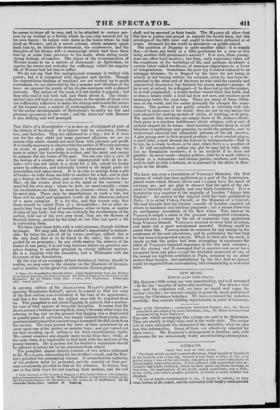THE Tales of a Grandfather * is in fact an
abridgment of part of the history of Scotland. It is history told by anecdotes, charac- ters, and sketches. They are addressed to a boy ; but if it were not for the dear child and some personal allusions, we see no reason why adults should not read them with pleasure and profit. It is hardly necessary to observe that the author of Waverly narrates an event, or points a pithy saying, to admiration : he has the taste to select, the knowledge to collect, and the mind and energy to animate the dry bones of the past. No one can take a view of the history of a country who is not impregnated with all its de- tails—who has not made it a study for a life, solved its knotty points by reflection, and habitually turned to its bright parts for consolation and amusement. It is in vain to abridge from a pile of books—to refer from one folio to another for a fact, and to pick pp a feature in this author, and correct it from reference to ano- ther ; all the events must live in the mind of the narrator : he must tell his own story : where he feels, he must amplify—where his recollections are faint, he must be general—where he forgets, he must skip. There may be imperfections in such a tale, but there will be spirit and animation worth all the laborious dulness of a mere compiler. It is for this, and this reason only, that these should be called Tales of a Grandfather; for in other re- spects they bear no kind of resemblance either in form or matter to tales of any kind : but they are evidently the recollections of the author, told out of his own grey head ; they are the flowers of Scottish history, picked by the hand of one who has spent a life in cultivating them. We have read these tales with a solid pleasure, though children no longer. We may add, that the author's impartiality is remark- able : he takes the side of all by turns—perhaps, indeed, this is the only fault that is to be found in the tales ; the author is guided by no principles ; he one while excites the interest of his reader in one party, it is not long however before we perceive our- selves leaning to another actuated by wholly different motives. He is a Jacobite with the Jacobites, and a Williamite with the favourers of the Revolution.
By the way of an example of how sketches of history should be written, we may refer to the chapter on the Massacre of Glencoe, and to another on the great but unfortunate Darien project.
* Tales of a Grandfather, Second Series; being Stories taken from the History of Scotland, from the Accession of James the First of England to the Union of the Kingdoms. By Sir Walter Scott, Bart. 3 vols., with Engravings. Edinburgh, 1825. Cadell and Co.


















 Previous page
Previous page